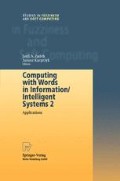Abstract
A fuzzy logic advisor (FLA), which is a nonlinear device that accepts numeric measurements as inputs and provides a linguistic value at its output, is developed for one specific type of social judgment, judgments of flirtation. Qualitative and quantitative descriptions of the FLA and a nine step methodology for designing the FLA are given. The FLA is compared against traditional regression models; it provides at least an order of magnitude better performance, which demonstrates that a FLA may indeed be applied to enhance our predictability of social judgments above and beyond that provided using traditional linear models. The implications and applications of such FLAs for assessing social judgments are discussed. Finally, why this is just a “first attempt” is explained.
Access this chapter
Tax calculation will be finalised at checkout
Purchases are for personal use only
Preview
Unable to display preview. Download preview PDF.
References
Combs, W. and J.Andrews (1998). “Combinatorial rule explosion eliminated by a fuzzy rule configuration.” IEEE Trans. on Fuzzy Systems, vol. 6, pp. 1–11.
Edwards, J. R. (1991). “Person job fit: a conceptual integration, literature review and methodological critique.” In C. L. Cooper und I. T. Robertson (Eds.), International review of industrial and organizational psychology, 6, (283–357). New York: Wiley.
Edwards, J. R. and Van Harrison, R. (1993). “Job demands and worker health: three-dimensional reexamination of the relationship between person-environment fit and strain.” Journal of Applied Psychology, 78, 628–648.
Hesketh, B., Smithson, M., and Hesketh, T. (1996). “Using fuzzy sets to conceptualize and measure P-E fit,” Proceedings of the American Psychological Association Conference. Toronto, Canada.
Karnik, N. N. and J. M. Mendel (1998a). “Introduction to type-2 fuzzy logic systems,” presented at the 1998 IEEE FUZZ Conference, Anchorage, AK, May.
Karnik, N. N. and J. M. Mendel (1998b). “Type-2 fuzzy logic systems: type-reduction,” presented at the 1998 IEEE SMC Conference, San Diego, CA, October.
Karnik, N. N. and J. M. Mendel (1998c). “Type-2 fuzzy logic systems, I: preliminaries,” submitted for publication.
Karnik, N. N. and J. M. Mendel (1998d). “Type-2 fuzzy logic systems, II: implementation,” submitted for publication.
Klir, G. J. and Yuan, B. (1995). Fuzzy sets and fuzzy logic: theory and applications. New Jersey: Prentice-Hall PTR.
Koeppel, L. B., Montagne-Miller, Y., O’Hair, D., and Cody, M. J. (1993). “Friendly? Flirting? Wrong?” In Interpersonal communication: evolving interpersonal. ( 13–32 ). New Jersey: Erlbaum.
Massaro, D. W. and Friedman, D. (1990). “Models of integration given multiple sources of information”. Psychological Review, 97. 225–252.
Mendel, J. M. (1995a). “Fuzzy logic systems for engineering: a tutorial.” IEEE Proceedings, 83. 345–377.
Mendel, J. M. (1995b). Lessons in estimation theory for signal processing, communications, and control. New Jersey: Prentice-Hall.
Mendel, J. M. (1995b). “Computing with words, when words mean different things to different people,” submitted for publication.
Mendel, J. M., Martin, M., Murphy, S. T., Miller, L. C., and Karnik, N. (1996). The fuzzy logic advisor a paradigm for social judgements. USC SIPI Report #305, Univ. of Southern California, Los Angeles, CA.
Zadeh, L. A. (1965). “Fuzzy sets.” Information and Control, 8. 338–353.
Zadeh, L. A. (1973). “Outline of a new approach to the analysis of complex systems and decision processes.” IEEE Transactions on Systems, Man and Cybernetics, 3. 28–44.
Zadeh, L. A. (1996). “Fuzzy logic = computing with words.” IEEE Trans. on Fuzzy Systems, vol. 4, pp. 103–111.
Author information
Authors and Affiliations
Editor information
Editors and Affiliations
Rights and permissions
Copyright information
© 1999 Springer-Verlag Berlin Heidelberg
About this chapter
Cite this chapter
Mendel, J.M., Murphy, S., Miller, L.C., Martin, M., Karnik, N. (1999). The Fuzzy Logic Advisor for Social Judgments: A First Attempt. In: Zadeh, L.A., Kacprzyk, J. (eds) Computing with Words in Information/Intelligent Systems 2. Studies in Fuzziness and Soft Computing, vol 34. Physica, Heidelberg. https://doi.org/10.1007/978-3-7908-1872-7_22
Download citation
DOI: https://doi.org/10.1007/978-3-7908-1872-7_22
Publisher Name: Physica, Heidelberg
Print ISBN: 978-3-7908-2461-2
Online ISBN: 978-3-7908-1872-7
eBook Packages: Springer Book Archive

